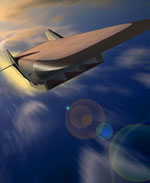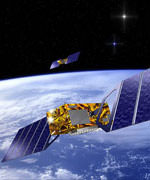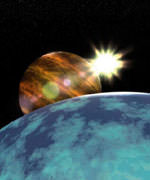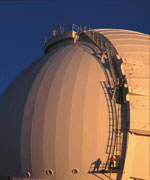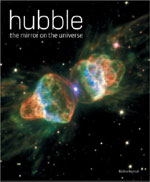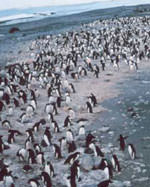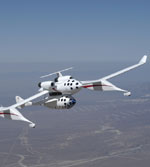
Image credit: Scaled Composites
The US government passed four new bills by voice vote that promote space and astronomy. The Commercial Space Act of 2003 hopes to better regulate commercial space launches, such as sub-orbital tourist flights. The Charles `Pete’ Conrad Astronomy Awards Act will encourage amateur astronomers to help spot potential Earth-crossing asteroids. The Remote Sensing Applications Act of 2003 will provide funding for satellite images to support various projects. And the Human Space Flight Independent Investigation Commission Act of 2003 will establish and independent commission to investigate future disasters, like the loss of Columbia.
The House Science Subcommittee on Space and Aeronautics today approved four bills by voice vote, listed below.
H.R. 3245, “Commercial Space Act of 2003,” sponsored by Rep. Dana Rohrabacher (R-CA)
This bill clarifies the legislative framework for commercial human space flight. Currently, the Federal Aviation Administration (FAA) Office of Space Transportation (AST) regulates U.S. commercial space launches for television, telecommunications and imagery satellites. H.R. 3245 ensures that commercial launchers – such as those being built by entrepreneurs to take people to the edge of space – would also be regulated by AST.
Last July, the Space & Aeronautics Subcommittee held a joint hearing with the Senate Commerce Committee on the regulatory issues facing such commercial human space. All of the witnesses at that hearing called for legislation to clearly define the FAA’s regulatory responsibilities on this issue.
“I believe that most Members of Congress share my view that the aerospace industry plays a critical role in advancing America’s space frontier,” said Subcommittee Chairman Rohrabacher. “This bill tells the Department of Transportation that this new commercial human space flight industry should be nurtured by streamlined and careful regulation”
The bill authorizes $11,523,000 and $11,000,000 for fiscal years 2004 and 2005, respectively, for the AST. The bill also authorizes $1,800,000 and $2,000,000 for fiscal years 2004 and 2005, respectively, for the Department of Commerce’s Office of Space Commerce, and delegates licensing authority for private-sector remote sensing systems to this Office.
H.R. 912, “Charles `Pete’ Conrad Astronomy Awards Act,” sponsored by Rep. Dana Rohrabacher (R-CA)
The Charles “Pete” Conrad Astronomy Awards Act, named for the third man to walk on the moon, establishes awards to encourage amateur astronomers to discover and track asteroids crossing in a near-Earth orbit. Earth has experienced several near-misses with asteroids that would have proven catastrophic, and the scientific community relies heavily on amateur astronomers to discover and track these objects. The bill authorizes $10,000 for each of fiscal years 2004 and 2005 for NASA to administer the program. The House approved the bill by voice vote last year.
“Pete Conrad was a pilot, explorer, and entrepreneur of the highest caliber. I think it is fitting that we honor Pete Conrad by establishing this award to encourage amateur astronomers and private citizens to keep looking up and out into the future,” said Rohrabacher.
H.R. 1292, “Remote Sensing Applications Act of 2003,” sponsored by Rep. Mark Udall (D-CO)
The Remote Sensing Applications Act, also approved by the House last year, will establish a grant program to help integrate remote sensing data to address state, local and regional needs. The U.S. already collects an abundant amount of remote sensing data, but it is often used only for scientific ventures. However, it can have countless local applications including urban planning, coastal zone management, resource supervision and disaster monitoring for state and local authorities. The bill authorizes $15,000,000 for each of the fiscal years 2004 through 2008 for NASA to carry out this program.
“The Remote Sensing Applications Act gives state and local governments 21st century tools to deal with 21st century challenges. My bill will help begin to bridge the gap between established and emerging technology solutions and the problems and challenges we face regarding growth management, homeland security, forest fire management and other issues,” said Udall. “I am pleased the Subcommittee passed the bill today, and hope the full Committee will soon follow suit.”
H.R. 2450, “Human Space Flight Independent Investigation Commission Act of 2003,” sponsored by Rep. Bart Gordon (D-TN)
H.R. 2450 would establish an independent, Presidentially-appointed investigative Commission in the event of incidents in the nation’s human space flight program that result in loss of crew, passengers, or spacecraft, including the International Space Station.
The Commission will consist of 15 members, to include the Chairman of the NTSB and 14 members appointed by the President and drawn in part from lists of candidates from the Majority and Minority Leaders of the Senate, and the Speaker and the Minority Leader of the House of Representatives. Except for the Chairman of the NTSB, no officer or employee of the Federal Government would serve as a member of the Commission.
Subcommittee Ranking Democrat Gordon said, “I appreciate the subcommittee’s support for this legislation, which provides for an independent and accountable accident investigation commission if, God forbid, we have another mishap in space. I hope the rest of my colleagues in the full Science Committee will act quickly to get this bill enacted into law.”
The Subcommittee accepted an amendment offered by Chairman Rohrabacher, clarifying that only those incidents involving missions carrying out U.S. Government activities would trigger the Presidentially-appointed Commission.
Original Source: House Committee on Science News Release

